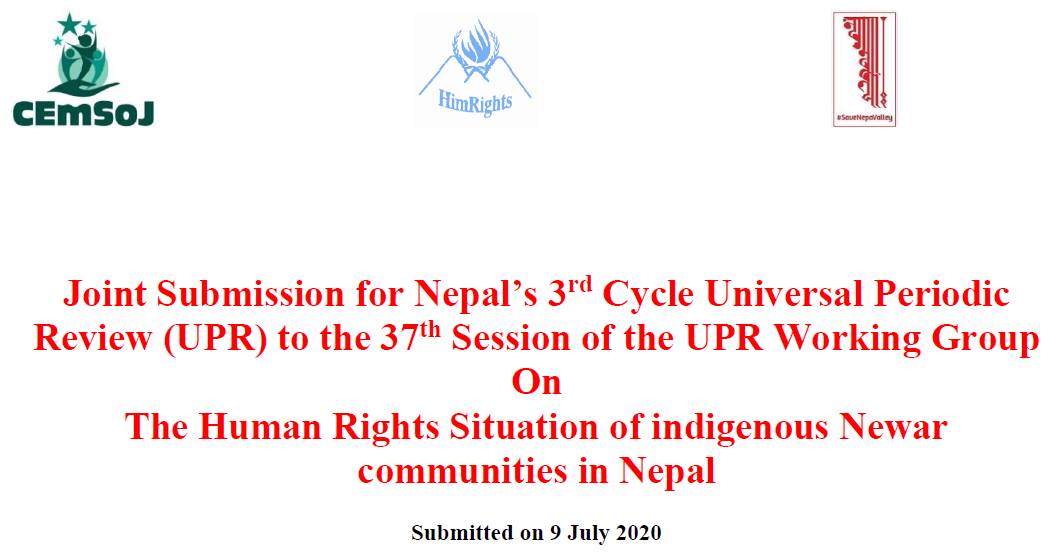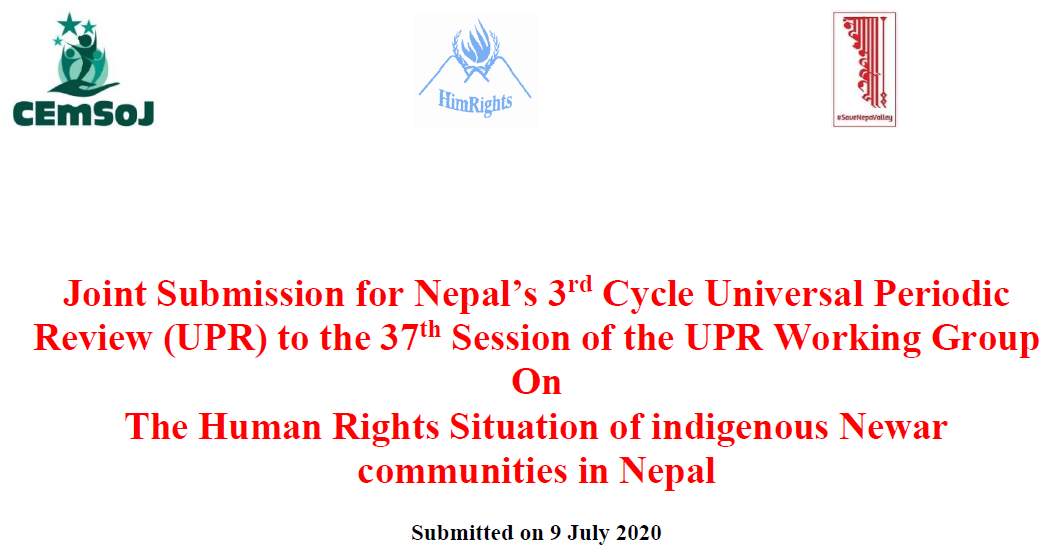Community Empowerment and Social Justice Network (CEMSOJ), Himalayan Human Rights Monitors (HimRights) and Save Nepa Valley movement today made a joint submission for the 3rd Universal Periodic Review (UPR) of Nepal. The UPR is a unique process which involves a review of the human rights records of all UN Member States and is held under the auspices of the UN Human Rights Council. The submission presents key human rights challenges faced by indigenous Newar communities, particularly in the context of “development” projects in Nepal and examines the compliance of the Government of Nepal with seven recommendations received during the 2nd UPR cycle of Nepal related to the rights of Newar and other indigenous nationalities.

The groups making the submission have expressed concern that Nepal’s legislative processes and development policies and projects as well as private investments in the country violate the rights of indigenous Newar and other communities and their overall well-being. While those affected indigenous groups, particularly indigenous women, have limited participation in decision-making processes in Nepal’s State structures, they are further alarmed by restrictions on freedom of assembly in Nepal manifested through the use of excessive security force to supress protests, which makes it further difficult for those groups to demand remedies for the harms they suffer.
While discussing the human rights challenges faced by indigenous Newar communities, the assessment in the submission demonstrates that the Government has failed to effectively or fully implement the recommendations related to the rights of indigenous peoples and freedom of assembly as well as redress for discrimination in post-earthquake reconstruction, among others. Accordingly, following recommendations are made in the submission to address to ensure sustainable development with respect for the rights of individuals and communities.
- The Government should recognize the rights of indigenous peoples to maintain and develop their own customary systems and institutions such as Guthi of Newars with separate legal arrangement and autonomy for Guthis, including full ownership and control of their lands and resources and management of their internal and local affairs.
- The Government, in conjunction with the concerned indigenous communities and their customary and representative institutions such as the Guthis of Newars, should undertake appropriate measures to identify, demarcate and title their traditional lands and resources as well to return such lands and resources lost by the communities to State, business or other actors, where feasible, or provide effective remedy for such loss if return is not possible.
- In the context of “development” projects such as Kathmandu Valley Road Improvement Project, Kathmandu – Terai/Madhesh Fast Track Project, Kathmandu Outer Ring Road, Smart Cities, Bagmati River Basin Improvement Project, Thankot – Bhaktapur Transmission Line Project and Chobhar Dry Port affecting indigenous Newar communities, the Government, in line with the recommendations of the UN’s Committee on the Elimination of Racial Discrimination (CERD), Committee on Economic, Social and Cultural Rights (CESCR) and the Special Rapporteur on the rights of indigenous peoples, should
- adopt appropriate measures to ensure that the concerned indigenous communities are meaningfully consulted, through their own representative institutions, and to obtain their Free, Prior and Informed Consent (FPIC) before launching any development project as well as in the planning and undertaking of such project that affects their traditional land or resources.
- provide redress to the communities or affected families for their loss of land or access to natural resources (such as fair and adequate compensation for those forcibly evicted or whose houses were demolished for road expansion or return of land already seized for Fast Track highway) incurred without their free, prior and informed consent when that loss has occurred by the establishment of development projects’.
- With regards to private and communal lands and resources of Newars and other indigenous communities acquired in the past for various State such as in relation to the Chobhar dry port, business or other projects, the Government should return them to the original landowners if those lands and resources are not used in their original purpose or the concerned landowners or communities do not agree with the changed purpose of the land or resource use in line with national and international legal obligations of Nepal.
- The Government should, in conjunction with representative institutions of indigenous peoples, undertake a comprehensive program for amendments to the constitution and existing laws or formulation of necessary new laws, policies and plans for implementation of Nepal’s commitments under the ILO Convention 169 and the UNDRIP. Such program should particularly ensure the rights of indigenous peoples to their lands, territories and resources, to development and to self-determination, including for indigenous women, in line with the recommendation of the Committee on the Elimination of Discrimination against Women (CEDAW).
- The Government should halt reversal of affirmative measures such as existing legal provisions for reservation/quota for indigenous peoples and other marginalized groups and should strengthen implementation of those provisions to ensure access by members of marginalized indigenous communities, particularly indigenous women, to employment in civil service and public institutions.
- The Government should immediately adopt multilingual policy for its official languages at federal, provincial and local governments with provision of necessary resources to promote use local indigenous languages in its works.
- The Government should invest more resources to promote mother-tongue based multilingual education in public/community schools as well as to support indigenous communities or their representative institutions to set up their own educational institutions and systems.
- The Government should undertake targeted measures with provision of adequate resources to support marginalized groups such as indigenous peoples in post-earthquake reconstruction of their private and communal properties with meaningful consultation with the concerned communities to obtain their consent on the reconstruction policies.
Click here to download the full submission
